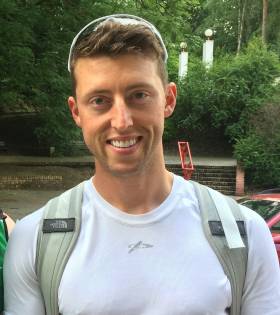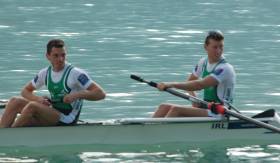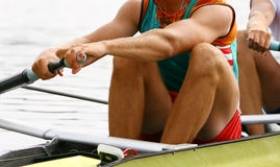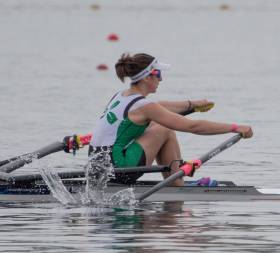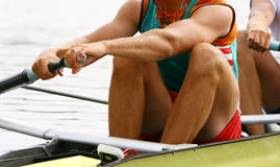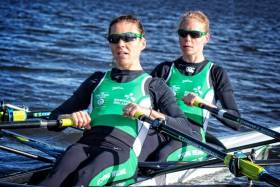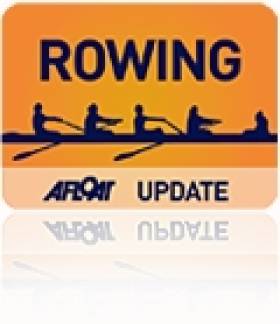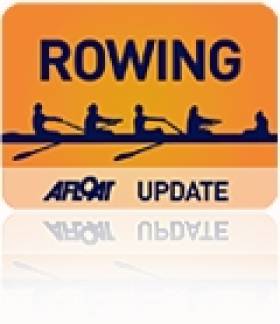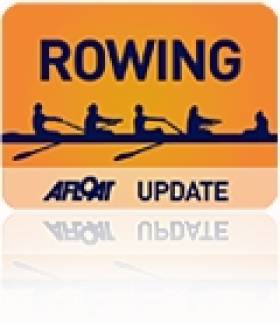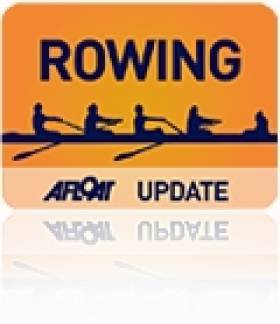Displaying items by tag: O'Driscoll
Fifth in A Final for O'Driscoll and O'Donovan
#Rowing: Ireland's Shane O'Driscoll and Mark O'Donovan finished fifth in the A Final of the lightweight double sculls at the World Cup regatta in Poznan, Poland this afternoon. The Irish crew put in a good final third, but they had slipped too far back to find a medal placing. At the head of the field, Britain's Sam Scrimgeour and Joel Cassells came under real pressure from Denmark, but held out, with France taking the bronze medal.
World Cup Regatta, Poznan, Poland (Irish interest; selected results)
Men
Lightweight Pair - Repechage (First Four to A Final; rest to B Final): 1 Ireland (M O'Donovan, S O'Driscoll) 6:36.95, 2 Denmark 6:39.04, 3 Germany 6:42.79, 4 Turkey 6:44.77; 5 Netherlands 6:49.26, 6 Austria 7:05.32. A Final: 1 Britain 6:26.78, 2 Denmark 6:27.66, 3 France 6:29.79; 4 Turkey 6:30.84, 5 Ireland 6:32.14, 6 Germany 6:35.45.
Lightweight Double Sculls - Repechage (First Two to A Final; Rest to B Final): 1 Ireland (G O'Donovan, P O'Donovan) 6:15.08, 2 Britain (W Fletcher, R Chambers) 6:15.22; 3 Germany 6:15.91, 4 Switzerland 6:36.24, 5 Romania.
Women
Lightweight Single Sculls - D Final (Places 19, 20): 1 Ireland (D Walsh) 8:04.66, 2 Thailand (R Raklao) 8:25.85.
O'Driscoll and O'Donovan Win Repechage To Take A Final Place
#Rowing: Ireland's good start to the second day of the World Cup regatta in Poznan in Poland continued as the lightweight men's pair won their repechage and took their place in the A Final. In bright, sunny, conditions with a strong tailwind, Mark O'Donovan and Shane O'Driscoll were in control of this race from half way and won with a clearwater lead. Denmark, Germany and Turkey took the other A Final places. The Netherlands and Austria were off the pace all through and will compete in the B Final.
World Cup Regatta, Poznan, Poland (Irish interest; selected results)
Men
Lightweight Pair - Repechage (First Four to A Final; rest to B Final): 1 Ireland (M O'Donovan, S O'Driscoll) 6:36.95, 2 Denmark 6:39.04, 3 Germany 6:42.79, 4 Turkey 6:44.77; 5 Netherlands 6:49.26, 6 Austria 7:05.32
Women
Lightweight Single Sculls - D Final (Places 19, 20): 1 Ireland (D Walsh) 8:04.66, 2 Thailand (R Raklao) 8:25.85.
O'Driscoll and O'Donovan Fourth in Awful Conditions
#Rowing: In extreme conditions, Ireland's Mark O'Donovan and Shane O'Driscoll finished fourth in their heat of the lightweight men's pair at the World Cup in Poznan in Poland. Britain's Sam Scrimgeour and Joel Cassells took the one A Final place on offer, while O'Donovan and O'Driscoll battled it out with Germany and Turkey behind them in a powerful tailwind and driving rain. These crews will have a repechage tomorrow - unusually, on the same day as the final.
World Cup Regatta, Poznan, Poland (Irish interest; selected results)
Men
Lightweight Pair - Heat Two (First to A Final; rest to Repechage): 1 Britain (J Cassells, S Scrimgeour) 6:44.66; 4 Ireland (M O'Donovan, S O'Driscoll) 6:48.29.
Lightweight Double Sculls - Heats (Winner to A Final; rest to Repechages) - Heat One: 1 France 6:19.48; 3 Britain (W Fletcher, R Chambers) 6:25.13.
Heat Two: 1 Norway 6:18.90; 2 Ireland (G O'Donovan, P O'Donovan) 6:19.45, 3 Austria 6:34.23.
Women
Lightweight Double Sculls - Heats (Winner to A Final; rest to Repechages) - Heat One: 1 Netherlands 7:04.01.
Heat Two: 1 Ireland (C Lambe, S Lynch) 7:05.36; 2 Poland 7:06.48, 3 Netherlands Two 7:09.28.
Lightweight Single Sculls - Heat Two (First Two to A/B Semi-Finals; rest to Repechages): 1 Denmark (A Runge Holmegaard) 7:55.99, 2 Netherlands Three (A Van Zomeren) 7:56.83;
3 Ireland (D Walsh) 8:11.09.
#Rowing: Ireland had two fourth-place finishes in their first two A Finals of the European Rowing Championships in Brandenburg in Germany. The lightweight men’s pair of Mark O’Donovan and Shane O’Driscoll finished impressively to push Germany into fifth. Britain’s Sam Scrimgeour and Joel Cassells won, with Denmark second and Spain third. Lightweight single sculler Denise Walsh also had a good final quarter. Her race was dominated by Anja Noske of Germany, with Denmark and the Netherlands taking silver and bronze. Sinéad Jennings and Claire Lambe finished third in the B Final of the women’s lightweight double sculls, ninth overall. Sweden beat Britain into second, with Ireland over two seconds further back.
European Rowing Championships, Brandenburg, Germany – Day Three (Irish interest; selected results):
Men
Lightweight Pair – A Final: 1 Britain (S Scrimgeour, J Cassells) 7:00.38, 2 Denmark 7:03.94, 3 Spain 7:05.32; 4 Ireland (M O’Donovan, S O’Driscoll) 7:09.67
Women
Lightweight Double Sculls – B Final (Places 7 to 12): 1 Sweden 7:27.70, 2 Britain 7:27.99, 3 Ireland (C Lambe, S Jennings) 7:30.28.
Lightweight Single Sculls – A Final: 1 Germany (A Noske) 8:26.75, 2 Denmark 8:32.54, 3 Netherlands 8:37.05; 4 Ireland (D Walsh) 8:42.93.
#Rowing: Mark O’Donovan and Shane O’Driscoll gave Ireland their second A Final place at the European Rowing Championships in Brandenburg in Germany with a second-place finish in this morning’s repechage. The Ireland lightweight pair rowed a brave race. Four boats qualified from six, but it was a battle all the way down the course. O’Donovan and O’Driscoll had a good start and led all the way until the final quarter, where Denmark passed them. The margins were tight for qualification: Poland found themselves edged out by six hundredths of a second by fast-finishing Portugal.
Denise Walsh had earlier qualifed for the A Final of the lightweight single sculls.
European Championships, Brandenburg, Germany – Day Two (Selected results, Irish interest)
Men
Lightweight Pair – Repechage (First Four to A Final; rest to B Final): 1 Denmark 7:26.63, 2 Ireland (M O’Donovan, S O’Driscoll) 7:27.99, 3 Germany 7:29.0, 4 Portugal 7:29.70.
Women
Lightweight Single Sculls – Repechage (First Two to A Final; rest to B Final): 1 Ireland (D Walsh) 8:39.41, 2 Britain (I Walsh) 8:41.08.
Jennings and Lambe Win C Final at World Cup in Varese
#Rowing: Sinéad Jennings and Claire Lambe ended their campaign at the World Cup Regatta in Varese with a commanding performance to win the C Final of the lightweight double sculls. They led all the way and were four lengths clear of nearest rivals, Italy Three, at the finish.
Ireland had two competitors in the repechage of the women’s lightweight single sculls. There were two places on offer in an A Final, but Poland and Switzerland One took these. Siobhán McCrohan finished fifth and Denise Walsh sixth. In the lightweight men’s four, Ireland battled it out for third in the C Final with Austria, losing out by .15 of a second. In the C Final of the women’s pair, Leonora Kennedy and Barbara O’Brien finished third. Norway pipped Ukraine to win.
World Cup Regatta, Varese – Day Two (Selected Results, Irish interest)
Men
Lightweight Four – C Final (places 13 to 16): 1 Canada One 6:09.73, 2 Serbia 6:11.21, 3 Austria 6:15.85, 4 Ireland (L Seaman, M O’Donovan, L Keane, S O’Driscoll) 6:16.00.
Women
Pair – C Final (places 13 to 16): 1 Norway One 7:22.74, 2 Ukraine 7:23.16, 3 Ireland (L Kennedy, B O’Brien) 7:33.07.
Lightweight Double Sculls – C Final (places 13 to 17): 1 Ireland (C Lambe, S Jennings) 7:17.24, 2 Italy Three 7:26.29, 3 Chile 7:29.71.
Lightweight Single Sculls – Repechage (First Two to A Final; rest to B Final): 1 Poland Two 7:49.90, 2 Switzerland One 7:51.76; 5 Ireland Two (S McCrohan) 8:04.69, 6 Ireland One (D Walsh) 8:08.81
O'Driscoll and O'Donovan Sixth in Lucerne A Final
#Rowing: Mark O’Donovan and Shane O’Driscoll finished sixth in the A Final of the men’s lightweight pair at the World Cup in Lucerne. Britain and Italy fought it out for gold, with Italy winning. Denmark took bronze. The Ireland crew were in sixth through the four quarters.
Denise Walsh finished 4th in her B Final, 10th overall in the lightweight single sculls.
World Cup Regatta, Lucerne – Day One (Irish interest; selected results)
Men
Lightweight Pair – Repechage (First Four to A Final): 4 Ireland (M O’Donovan, S O’Driscoll) 6:50.28. A Final: 1 Italy 6:54.52, 2 Britain 6:54.71, 3 Denmark 6:56.81; 6 Ireland 7:14.15.
Lightweight Double Sculls – C Final (Places 13 to 18): 2 Ireland (G O’Donovan, P O’Donovan) 6:23.91.
Women
Pair – C Final (Places 13 to 18): 5 Ireland (H Hannigan, L Dilleen) 7:29.47.
Double Sculls – A/B Semi-Final (First Three to A Final; rest to B Final): 1 Belarus 7:14.98, 2 Germany 7:17.52, 3 Greece 7:19.13; 5 Ireland (H Hannigan, L Dilleen) 7:26.75.
Lightweight Double – A/B Semi-Final (First Three to A Final; rest to B Final): 1 South Africa 7:35.26, 2 US 7:36.79, 3 Germany 7:39.14; 5 Ireland (C Lambe, S Jennings) 7:44.11
Single Sculls – A/B Semi-Final (First Three to A Final; rest to B Final): 1 Australia (K Crow) 7:55.81, 2 United States (G Stone) 8:00.20, 3 New Zealand (F Bourke) 8:03.10; 5 Ireland (S Puspure) 8:11.50.
Lightweight Single – Repechage One (Two to A Final; rest to B Final): 3 Ireland (D Walsh) 8:11.47. B Final (Places 7 to 12): 1 South Africa (K Johnstone) 8:34.06; 4 Ireland (Walsh) 8:39.41.
Lightweight Four Emerge from Ireland Trial
#ROWING: A lightweight men’s four of Shane O’Driscoll, Anthony English, Mark O’Donovan and Niall Kenny impressed the selectors at the Ireland trial at the National Rowing Centre sufficiently to become the nominated crew to train in advance of the final trial in March. Sinéad Jennings and Emma Desmond, who are both injured, were missing from the trial for the lightweight women’s double sculls. The matrix for the available candidates ranked Claire Lambe and Denise Walshe as the fastest crew. Paul and Gary O’Donovan are the nominated men’s lightweight double for the March Trials.
Ireland Trial, National Rowing Centre, Cork (Selected Results; ranked on per centage of projected World Championship gold medal winning time)
Men
Four, Under-23 Double and U-23 Lightweight Double: 1 E Rowan, S McKeown (heavyweight double) 7:11.86 (82.4), 2 Coughlan, Deere, Crowley Meehan (four) 6:46.77 (82.4), 3 F McCarthy, M Ryan (lm double) 7:27.35 (80.9).
Sculling and Lightweight Four: 1 G O’Donovan, P O’Donovan (lightweight double) 6:55.94 (87.0), 2 N Kenny, M O’Donovan, A English, S O’Driscoll (light four) 6:42.50 (84.5), 3 J Keohane, P Doyle (heavy double) 7:07.0 (83.2).
Single Sculls: 1 J Ryan (Lightweight) 7:49.42 (84.8 per cent), 2 S Toland 7:59.6 (lwt, 83.0) 3 M Rowan (heavyweight) 7:51.8 (82.7).
Women
Single/Double Sculls, heavyweight – Race One: 1 L Dilleen 8:03.21 (88.0), 2 L Kennedy 8:21.14 (84.8), 3 Dineen/O’Brien 8:06.17 (80.6). Race Two: 1 O Finnegan 8:41.3 (81.5), 2 A Keogh 8:49.40 (80.3), 3 O Forde 9:00.18 (78.7).
Lightweight Double Matrix: 1 D Walsh, C Lambe 7:36.38 (88.1), 2 S McCrohan, Sarah Dolan 7:43.12 (86.8), 3 R Morris, Sarah Dolan 7:56.55 (84.4).
Morris and Hayes Fourth at World University Rowing
#ROWING: The Ireland lightweight women’s double scull finished fourth at the World University Games in Gravelines in France today. Poland and Britain comfortably took the gold and silver medals, while Ruth Morris and Orla Hayes pressurised Mexico, who held third. However, the Mexicans held on to take bronze.
The men’s lightweight double of Shane O’Driscoll and Gary O’Donovan took sixth in their A Final.
World University Championships, Gravelines, France (Irish interest; selected results)
Men
Lightweight Double Sculls – A Final: 1 Britain 6:49.95, 2 Hungary 6:51.19, 3 France 6:54.01; 6 Ireland 7:06.62.
Single Sculls – B Final (Places 7 to 12): 3 Ireland (Hughes) 7:19.25.
Lightweight Single Sculls - B Final (Places 7 to 12): 3 Ireland (Beck) 7:29.08.
Women
Four – B Final (Places 7 to 10): 3 Ireland 7:27.46.
Lightweight Double Sculls – A Final: 1 Poland 7:43.43, 2 Britain 7:44.49, 3 Mexico 7:52.01; 4 Ireland 7:55.00.
Lightweight Single Sculls – B Final (Places 7 to 10): 4 Ireland (Dolan) 8:26.36.
Ireland A Finalists at World University Rowing Championships
#ROWING: Two Ireland crews will compete in A Finals at the World University Rowing Championships in Gravelines in France. Ireland’s lightweight double scull of Gary O’Donovan and Shane O’Driscoll finished third in their semi-final today out of an unfavourable lane two in difficult conditions. The women’s lightweight double of Ruth Morris and Orla Hayes also qualified for the A Final, winning their repechage. The three other Ireland crews will compete in B Finals tomorrow.
World University Championships, Gravelines, France. Day Two (Irish interest; selected results)
Men
Lightweight Double Sculls – Semi-Final Two (Three to A Final; rest to B Final): 1 Britain 7:11.03, 2 Germany 7:13.41, 3 Ireland (G O’Donovan, S O’Driscoll) 7:24.64.
Single Sculls – Repechage One (First Two to A Final; rest to B Final): 4 (T Hughes) 7:57.06.
Lightweight Single Sculls – Repechage Two (First Three to A/B Semi-Final; rest to C Final): 3 Ireland (C Beck) 8:15.18. Semi-Final One (Three to A Final; rest to B Final): 5 Beck 8:18.31.
Women
Four – Repechage (First Two to A Final; rest to B Final): 6 Ireland (N Long, O Finnegan, G Collins, S Dineen) 7:51.42.
Lightweight Double Sculls – Repechage One (First Two to A Final; rest to B Final): 1 Ireland (R Morris, O Hayes) 7:45.17, 2 Canada 7:46.81.
Lightweight Single Sculls – Repechage One (First Two to A Final; rest to B Final); 6 Ireland (Sinéad Dolan) 8:37.95.


























